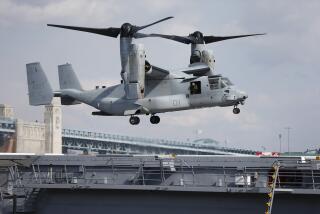Pentagon Rigs Arms Tests, House Investigator Says
- Share via
WASHINGTON — The Pentagon rigged tests on the Bradley Fighting Vehicle, the Maverick anti-tank missile and other weapons systems costing billions of dollars, raising serious questions about their safety, a veteran House investigator has charged.
Staff member Anthony Battista said in his report, made public Tuesday by the House Armed Services research and development subcommittee, that such unrealistic tests enabled the weapons to gain congressional funding.
Battista suggested that the panel consider scrapping the Army’s $11.3-billion Bradley armored personnel carrier, charging that the services manipulated tests on that vehicle, as well as the Air Force’s $6.1-billion Maverick air-launched missile and other, unnamed weapons.
Too Vulnerable?
He said the Bradley, which is equipped with a cannon, machine gun and missile launcher, left unresolved questions about its vulnerability and combat role.
“There may be less costly, more effective alternatives to the Bradley,” Battista wrote.
He said the Army’s live-fire tests of the Bradley’s armor at Aberdeen Proving Ground in Maryland last fall failed to simulate realistic battlefield conditions.
Army spokesmen insist that the live-fire tests of the vehicle’s armor were legitimate, proving that it offered “sturdy resistance” to an attacker.
The subcommittee scheduled a hearing to hear testimony on the Bradley from Battista; from the Army vice chief of staff, Gen. Maxwell Thurman, and from Col. James Burton, the Defense Department official who monitored Army testing of the vehicle.
Pentagon spokesmen did not immediately respond to Battista’s charges.
Congress has appropriated money for 2,955 of a requested 6,882 Bradley vehicles.
Deception Charged
Battista denounced unidentified Pentagon officials for deceiving Congress with an increasing use of unrealistic tests with predetermined outcomes. “I submit that objective testing is on the decline,” he said. “I believe that the key players in the Pentagon have become more a part of the problem than the solution.”
Battista said that, as a result of such Air Force tests of the Maverick, it is “at best a 50% missile (and) we will lose as many pilots firing the Maverick as the enemy will lose targets.”
The Air Force has obtained 400 of the 60,000 Mavericks it expects to receive, at an overall cost of $6.1 billion.
He also said that weak aluminum armor on some Navy ships, not specifically identified in his report but in use by the Navy, left them “vulnerable to the most simple kind of munitions.”
Battista described recent congressional efforts to monitor weapons testing as inadequate. He said the Pentagon’s new Operational Test and Evaluation Office, established to monitor major weapons acquisitions, is far too short of money and staffers to be effective.
He also criticized as unrealistic the angles from which the Army fired shots at the Bradley, the points on the armor selected for impact, and the use of inert fuses on ammunition stored inside the carrier to test for explosions.
Army spokesmen have said that the service did not run tests in all possible combat situations because it needed only certain information before deciding what improvements to make.
After last fall’s testing, scheduled as the first of three phases, the Army planned to spend $100,000 per vehicle to fortify the armor, add protection to the electrical system, and rearrange fuel and ammunition storage to reduce their vulnerability.
More to Read
Sign up for Essential California
The most important California stories and recommendations in your inbox every morning.
You may occasionally receive promotional content from the Los Angeles Times.













